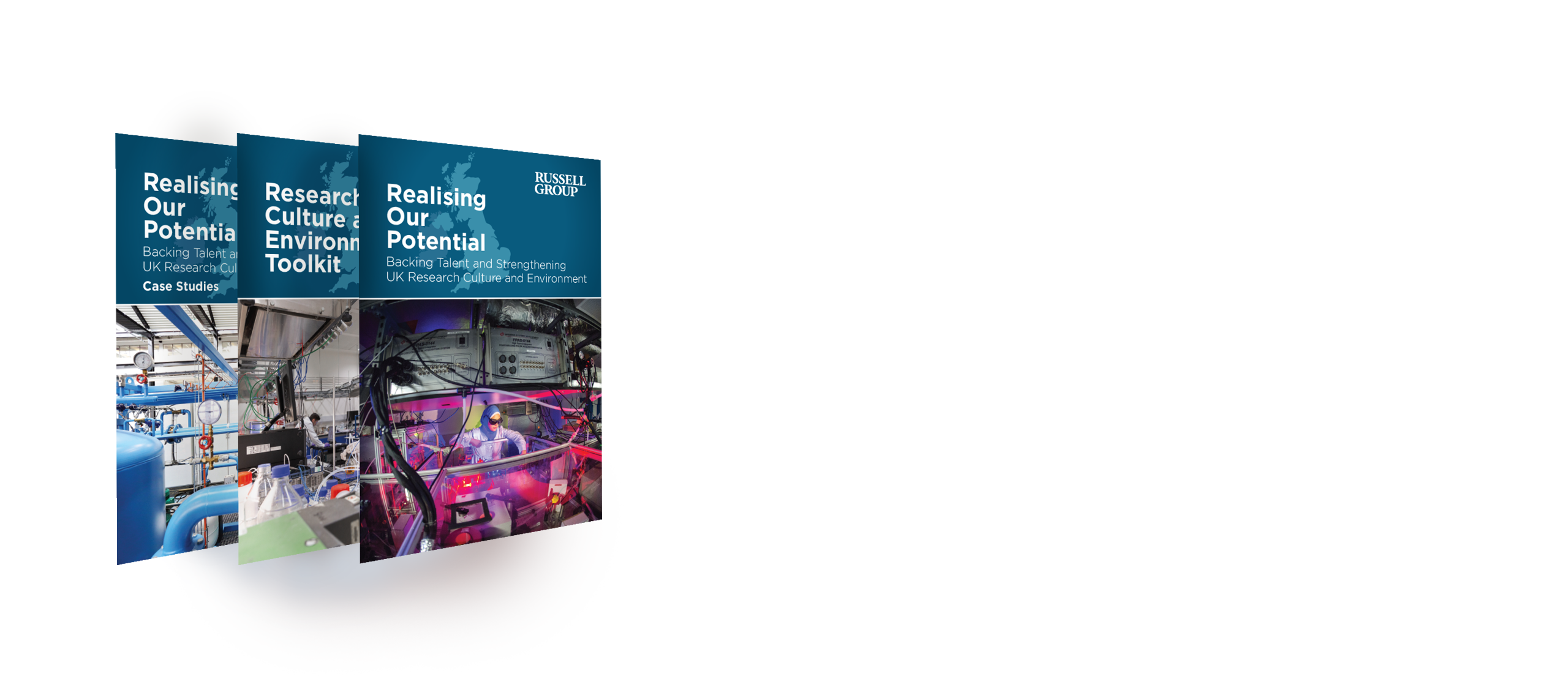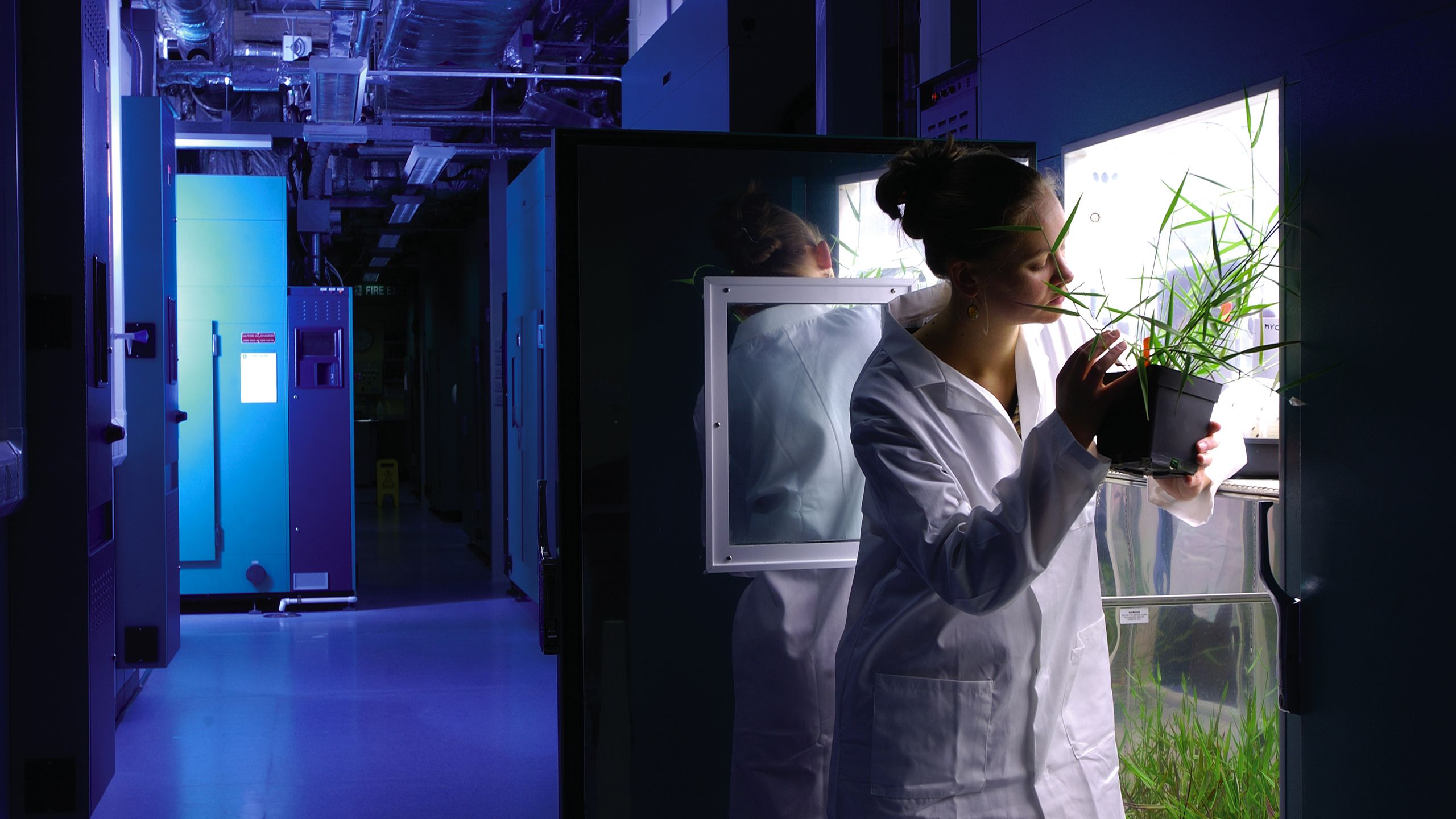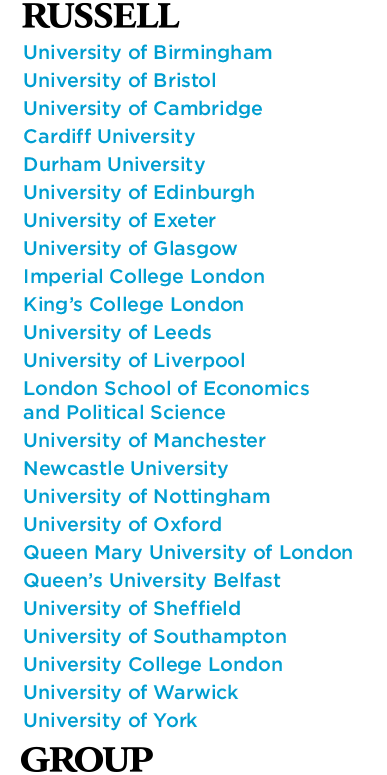Realising
Our
Potential
Backing Talent and Strengthening UK Research Culture and Environment

A positive working environment and culture are essential for researchers, and in turn, for research to thrive. Making this a priority will not only benefit researchers’ wellbeing, career development and research productivity, but will also help give the UK a global competitive advantage. This should enable us to recruit and retain the very best researchers, not just from our own shores, but from around the world.
Ensuring a healthy research culture and environment is crucial to attracting and retaining staff, ensuring a research-led recovery and building the UK’s reputation as a global leader in research.
Through conversations and interviews with close to 100 representatives from universities (including researchers at all career stages), funders and publishers, we have examined the current UK academic research culture and environment, including the system drivers and incentives which can create challenges and unintended consequences for researchers.
Amanda Solloway MP, Minister for Science, Research and Innovation, on the importance of research culture and environment:
Amanda Solloway, MP
Amanda Solloway, MP

What are we trying to achieve?
To foster ambitious, creative and innovative research we need a well-resourced and supportive research culture and environment which:
- Provides stable and appealing career paths, with equality of opportunity for all
- Values rigorous and open research, delivered through high-quality methods and high standards of research integrity
- Recognises and rewards the wide range of activities that contribute to an internationally excellent research environment
- Provides an inclusive, respectful and collegial environment in which researchers feel supported through their relationships with colleagues
- Prevents and addresses negative and unacceptable behaviours fairly and efficiently where they occur, including bullying and harassment.
Case study: Imperial College equality, diversity and inclusion seed fund
Students, researchers, teaching staff and other members of the Imperial College community who have an idea on how to promote equality, diversity and inclusion (EDI) are able to apply to the university’s EDI Seed Fund to make these ideas a reality.
Case study: University of Leeds Careers with Research Consultant
The University of Leeds funded the creation of a Careers with Research Consultant role to provide postdoctoral researchers and other research active staff with enhanced targeted career development support.
Researcher's perspective:
the importance of culture
Researcher at University of Glasgow's Institute of Infection, Immunity & Inflammation Dr Hua Wang talks about how the Research Culture and Environment Toolkit can offer practical help to ECRs
Researcher at University of Glasgow's Institute of Infection, Immunity & Inflammation Dr Hua Wang talks about how the Research Culture and Environment Toolkit can offer practical help to ECRs
Researcher's perspective:
structural issues in research
Dr Meghna Nag Chowdhuri at UCL Institute of Education's Primary Science Capital Project, talks about the structural issues facing researchers, particularly those who arrive in the UK
Dr Meghna Nag Chowdhuri at UCL Institute of Education's Primary Science Capital Project, talks about the structural issues facing researchers, particularly those who arrive in the UK
Research Culture and Environment Toolkit
Alongside our report, ‘Realising Our Potential’, we have published a toolkit which offers pragmatic steps that universities, funders and publishers can take collaboratively to achieve our shared goal of ensuring the UK is one of the best places in the world to do research.
"Improving research culture needs coordinated action from universities, funders, publishers and others across the research ecosystem as well as a more stable, long-term funding system for research which allows more strategic investments in the research base and reduces the unintended pressure created by fixed-term contracts and job insecurity."
Funder's perspective with UKRI:
Dame Ottoline Leyser on the Russell Group's report and how its recommendations can help build a dynamic, creative and diverse research environment, crucial to the UK's future prosperity:
Dame Ottoline Leyser, Chief Executive UKRI, on how to build a dynamic research environment.
Dame Ottoline Leyser, Chief Executive UKRI, on how to build a dynamic research environment.


Photo: Plant science research at the University of Sheffield. The university is working with partners to create a new institute to examine research systems and culture.
Photo: Plant science research at the University of Sheffield. The university is working with partners to create a new institute to examine research systems and culture.
Funder's perspective with UKRI:
Dame Ottoline Leyser on the Russell Group's report and how its recommendations can help build a dynamic, creative and diverse research environment, crucial to the UK's future prosperity:
Dame Ottoline Leyser, Chief Executive UKRI, on how to build a dynamic research environment.
Dame Ottoline Leyser, Chief Executive UKRI, on how to build a dynamic research environment.
Case study: Queen’s University Belfast Fellowship Academy
Early career researchers (ECRs) receive targeted career development support through the Queen’s Fellowship Academy, which provides support across three main themes: research funding, leadership development, and networking and impact.
Case study: University of Warwick Accolade programme
The Accolade scheme was developed by the university’s Institute of Advanced Study (IAS). Based on an innovative combination of competency training and support from an interdisciplinary community of practice, it aims to help postdoctoral and research fellows develop the skills necessary to build a successful independent academic career.
Further reading:
To request a large print version of the report, please contact us using the details below.
The Russell Group of Universities
www.russellgroup.ac.uk
+44 (0)20 3816 1300
enquiries@russellgroup.ac.uk
@russellgroup
©The Russell Group of Universities
A company limited by guarantee, registered in England and Wales under company number 06086902


